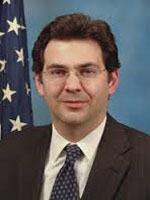 |
| Jonathan Blum--Courtesy of Centers for Medicare & Medicaid Services |
When the Medicare Part D program was launched a decade ago, seniors were guaranteed low-cost access to drugs in six broad treatment categories. But if recently proposed changes to the program are implemented, two of those drug classes will no longer be automatically covered--antidepressants and immunosuppressants used in organ transplants.
A rule proposed in January suggesting that change has sparked a huge outcry from patient advocates, who say seniors will suffer from fewer choices of drug treatments, and from the drug industry. Jonathan Blum, director of the Center for Medicare & Medicaid Services (CMS) is set to defend the proposed rule today at a hearing of the U.S. House Energy and Commerce Health Subcommittee.
In a statement released ahead of the hearing, Blum emphasized that the changes are needed to fend off rising drug costs. "Part D costs are projected to increase with the introduction of new, expensive biologic therapies, making it important for CMS to find ways to reduce costs when possible in order to keep premiums low," the statement said.
Blum said he believes the proposed changes would lead to increased competition and lower prices, because if the requirement to cover all drugs in a class were removed, drugmakers would have to negotiate to keep their products on plan formularies. Other proposed changes--including expanding preferred pharmacy networks for patients in return for lower co-pays--would also enhance competition, Blum argued.
Over 10 years, Part D has rung up costs of $346 billion, which is actually 45% lower than initially projected, notes Reuters. Medicare beneficiaries have saved $8.9 billion on prescription drug costs.
Removing antidepressants from the auto-pay list would surely dampen the prospects of several Big Pharma players that have sought to make up for lost revenues on off-patent blockbusters by introducing new products in that class. They include Forest Labs ($FRX) and Lundbeck, which last year introduced the antidepressants Fetzima and Brintellix respectively.
CMS is also eyeing a third drug class: antipsychotics. The agency says Part D will continue to cover them through 2015, while it reviews whether they should be automatically paid for under the program going forward.
More than 200 companies and industry groups are calling for the proposed rule to be withdrawn, including the Pharmaceutical Research and Manufacturers of America (PhRMA), which released a strongly worded statement on February 19. "The proposed changes would restrict patient access to needed medications, limit beneficiary choice of affordable plan options, and unlawfully interfere in a competitive, market-based program that is already working," PhRMA said. "Not only are these changes unnecessary; they could increase costs for both beneficiaries and taxpayers."
- access Blum's statement here
- here's PhRMA's release
- read more at Reuters